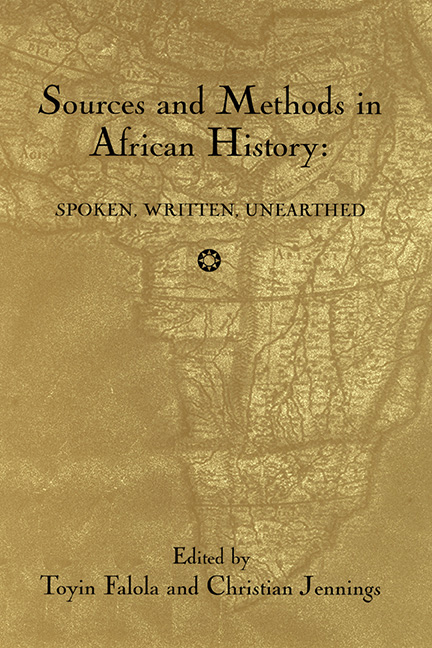Book contents
- Frontmatter
- Dedication
- Contents
- Acknowledgments
- Introduction
- Part I Archaeological Sources
- Part II Africa and the Atlantic World
- Part III Documentary Sources
- Part IV Oral Tradition
- 14 Section Introduction: Oral Tradition: Classic Questions, New Answers
- 15 Narratives on Pilgrimages to Mecca: Beauty versus History in Mande Oral Tradition
- 16 Kingship and the Mediators of the Past: Oral Tradition and Ritual Performance in Nupeland, Nigeria
- 17 Passages in a Struggle over the Past: Stories of Maji Maji in Njombe, Tanzania
- 18 Maisha: Life History and the History of Livelihood along the TAZARA Railway in Tanzania
- Part V Innovative Sources and Methods
- Contributors
- Index
16 - Kingship and the Mediators of the Past: Oral Tradition and Ritual Performance in Nupeland, Nigeria
from Part IV - Oral Tradition
Published online by Cambridge University Press: 25 October 2017
- Frontmatter
- Dedication
- Contents
- Acknowledgments
- Introduction
- Part I Archaeological Sources
- Part II Africa and the Atlantic World
- Part III Documentary Sources
- Part IV Oral Tradition
- 14 Section Introduction: Oral Tradition: Classic Questions, New Answers
- 15 Narratives on Pilgrimages to Mecca: Beauty versus History in Mande Oral Tradition
- 16 Kingship and the Mediators of the Past: Oral Tradition and Ritual Performance in Nupeland, Nigeria
- 17 Passages in a Struggle over the Past: Stories of Maji Maji in Njombe, Tanzania
- 18 Maisha: Life History and the History of Livelihood along the TAZARA Railway in Tanzania
- Part V Innovative Sources and Methods
- Contributors
- Index
Summary
Introduction
According to oral tradition, the precolonial centralised Nupe Kingdom and the Edegi dynasty were founded by the culture hero Tsoede or Edegi. This legitimating tradition provides support for both the kingship system and its rulers up to the present day. It is therefore not surprising that most existing Nupe king lists also begin with Tsoede. Scholars like Ade Obayemi and Aliyu Idrees have found the Tsoede legend to be a valid source for the reconstruction of the precolonial Nupe History. However, Michael Mason has argued that Tsoede is an invention of the twentieth century.
Before the nineteenth century, the Nupe kingdom belonged to the most important military powers in the Niger-Benue confluence area. Its spheres of political influence reached far into the territory of Bussa in the northwest, the regions of the Kamuku, Gbayi, and Kamberi in the north, and the Yoruba subgroups of the Igbomina, Yagba, Owe, and Oworo on the west bank of the river Niger. By the time of Etsu Mohammad's death in 1805, the moment when the kingdom began its decline, the influence of the Nupe Empire had extended beyond Nupeland into the northeast of the Old Oyo kingdom of the Yoruba people.
Although the Nupe people have experienced many transformations during the last two hundred years—such as the fall of the Nupe kingdom by 1805, the impact of Muslim Fulbe rulers during the nineteenth century, the British colonial power by the end of that century, and finally the modern Nigerian state in the post-colonial period—its system of kingship has survived into the present with the two Edegi successor dynasties at Pategi and Zugurma. The complex traditions concerning the origins of the Nupe Kingdom that have collected around the mythical hero Tsoede and subsequent history are preserved by the Nupe kings themselves, as well as by royal officials. Until recently these accounts were supplemented by non- Islamic ceremonies and rituals recalling and reenacting the past, such as the installation of the Nupe kings. Although these rituals have since been abandoned in favour of Islamic rituals, their performative plots and speeches are preserved by those officials who were involved in their performance, namely the king-makers and the traditional priests.
- Type
- Chapter
- Information
- Sources and Methods in African HistorySpoken Written Unearthed, pp. 268 - 294Publisher: Boydell & BrewerPrint publication year: 2003

